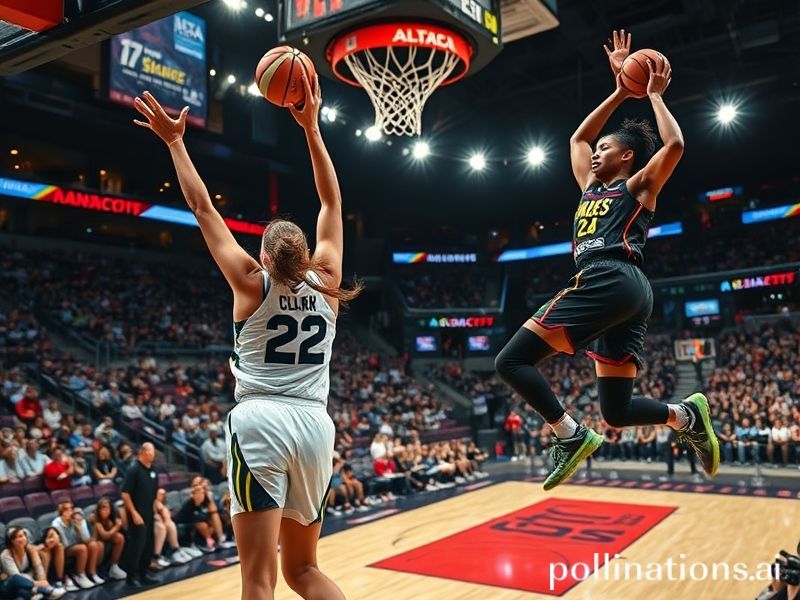Fever vs Aces: How One WNBA Game Became the World’s Newest Political Football (With Better Handles)
Fever vs Aces: How a Niche Sports Showdown Became a Global Thermometer
By the time the “Fever vs Aces” WNBA Finals rematch tipped off in Las Vegas last night, bookmakers from Manila to Manchester had already moved more money on Caitlin Clark’s three-point percentage than most central banks shift in a week. What began as a provincial American quarrel over basketball aesthetics—flashy rookies versus grizzled champions—has metastasized into a planetary Rorschach test. From Singapore trading floors to São Paulo sports bars, humanity is projecting its own fevers and aces onto a game played in the Nevada desert, proving once again that in the 21st century nothing stays local except your Wi-Fi password.
The matchup’s viral diplomacy began in May, when the Indiana Fever’s barnstorming tour through Europe sold out Madrid’s WiZink Center faster than the Spanish government can form a coalition. Clark’s no-look passes were clipped on Douyin, TikTok’s obedient Chinese twin, racking up 400 million views—roughly the population of the European Union, minus the ones too busy striking. Meanwhile, Las Vegas Aces jerseys started appearing in Lagos night markets, knock-offs stitched by entrepreneurs who’ve never seen a WNBA game but intuitively grasp the profit margin of counterfeit optimism.
International broadcasters, ever hungry for cheap content that isn’t another panel on “democratic backsliding,” seized the moment. Qatar’s beIN Sports slotted the game between Champions League reruns; the BBC dispatched a correspondent who previously covered Syrian ceasefires to explain why Kelsey Plum’s off-ball movement is “geopolitically significant.” (Translation: the license fee is due and editors like metaphors.) Even the Kremlin’s RT aired a heavily edited highlight package, adding ominous music every time A’ja Wilson blocked a shot—subtle as a polonium latte, but the message is clear: the West may argue over gender equity in sports, but Russia still controls your gas bill.
Of course, the fever metaphor writes itself. Global inflation is a 104-degree day that won’t break, climate records are being shattered like backboards, and populist rhetoric spreads faster than norovirus on a cruise ship. Against that backdrop, watching 24 women sprint hardwood seems almost therapeutic—until you notice the corporate patches on their jerseys resemble pharmaceutical logos. Pfizer sponsors the replay center; Moderna bought the kiss-cam. Somewhere in Davos, a brand manager is calculating the ROI of placing a statin ad next to a fast-break layup.
Gambling regulators on four continents have issued warnings, not because anyone might lose money—losing money is now a sanctioned global pastime—but because offshore crypto-books started offering derivatives on “total player fevers,” a prop bet tied to real-time body temperature. The Cypriot platform FeverSwap crashed when bettors tried to hedge against a hypothetical outbreak of influenza in the Aces locker room. The WHO, never one to miss a photo op, issued a statement reminding us that viruses don’t respect salary caps. Thanks, Geneva; we hadn’t noticed.
What makes this circus genuinely planetary is the merchandise pipeline. Indonesian factories that once churned out MAGA hats pivoted to “ACES HIGH” bucket hats in pastel tie-dye—same sweatshops, different delusion. Shipping containers full of them are currently stuck in the Red Sea, politely waiting for Houthis and insurance underwriters to finish their interpretive dance. By the time the hats reach American scalpers, the finals will be over, but scarcity will triple the price. Capitalism, like a good pick-and-roll, never stops moving.
And yet, beneath the cynicism, a small miracle flickers. In Nairobi, girls who previously risked fistulas just to fetch water now dribble under corrugated roofs, mimicking Clark’s step-back. In rural Argentina, the Aces’ motion offense is being diagrammed on blackboards next to grain prices. A game invented by a Canadian gym teacher to keep New England factory boys out of trouble has become, somehow, Esperanto in sneakers—proof that culture leaks across borders faster than any tariff can plug.
Final buzzer: Aces win 93–87, because experience beats exuberance, and gravity still outvotes hype. The planet yawns, checks its bets, and queues the next distraction. But somewhere a kid in Jakarta just nailed her first three-pointer, and for exactly 1.3 seconds the world’s collective temperature drops a tenth of a degree. Then the comment section reloads.







